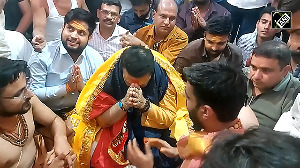'If enough of us take up the issue with their elected representatives, politicians will get the message.'

There is no denying that there is an element of satyagraha in all the three protests that are intent on saving Mumbai’s green lungs.
The citizens’ movement to save Aarey Milk Colony from construction, the thin edge of the wedge being a Metro car shed, took the Maharashtra government by surprise this year, forcing it to backtrack until it surreptitiously restored the proposal last week.
The people behind Save Aarey were ordinary citizens; banker Manish Gadia, businesswoman Renee Vyas, architect Rahul Jhunjhunwala, civil engineer Biju Augustine, actor Mona Ambegaonkar and environmental activists Stalin Dayanand and Rishi Aggarwal among others.
And they managed to get the crowds behind them, on social media and on the ground. It was Mumbai’s ‘India against Corruption’ moment.
In November, residents of Little Gibbs road in the tony area of Malabar Hill led the protest against a proposed road that would cut right through a portion of Kamala Nehru Park near Hanging Gardens.
Last Sunday, school children hugged the 74 trees that are in danger of being axed for the road -- in a throwback to the ‘Chipko’ movement of the Garhwal region where village women hugged trees to save them from timber contractors.
The Mumbai municipal corporation has responded to the protest by giving the same old assurances of looking into it. Incidentally, the proposal for the road came from the local Bharatiya Janata Party MLA Mangal Prabhat Lodha, also a prominent builder.
The latest to repose his faith in Gandhigiri, when the city has to be saved from those elected to govern it, happens to be a namesake of the Father of the Nation.
RTI activist Shailesh Gandhi is appealing to the conscience of individual municipal corporators to scrap the proposed civic policy on open spaces which, in an earlier avatar, led to several public playgrounds turning into preserves of the rich in the form of private clubs.
The ‘adoption policy’ proposed by the Brihanmumbai Municipal Corporation is about asking various bodies to take possession of civic plots and maintaining them.
The scheme had been initiated 15 years ago but was stopped after a public outcry when 13 open spaces became private clubs, such as the MIG Club in Bandra East and the Matoshree Club in Jogeshwari.
Shailesh Gandhi’s guess is that the Shiv Sena, which rules the BMC, revived the idea with some cosmetic changes as it has just one year to go before the civic polls.
The move to appeal to elected representatives may seem naive but Shailesh Gandhi has had some success with it. He used it with the Right to Information to stop the misuse of the Chief Minister’s Relief Fund under Vilasrao Deshmukh, then CM of Maharashtra. Likewise, he prevented the squandering of over Rs 1,000 crore of civic funds for the redevelopment of Crawford Market.
Gandhi, whose credo is ‘Mera desh mahaan nahin hai par yeh dosh mera hai (My country is not the great nation it ought to be but I am to blame for it)’, seems to have begun well, winning 40 converts at the very first meeting held at his house last Sunday.
They pledged to buttonhole as many corporators, as many MLAs and as many commoners on the need to preserve open spaces.
For the record, the Mumbai Metropolitan Region Development Authority puts the open space per person in the city at just 0.88 sq m or a little over 9 sq ft -- one of the lowest among global cities.
Prabha Pandey of Bandra, who attended the meeting, felt that Shailesh Gandhi’s approach could just be the thing that could rouse the public from its apathy and prevent one of the biggest-ever heists of public property.
Jayanth Tadinada and Vaibhav Sorte, two young IIT graduates, framed it differently. “First, the middle class was priced out of apartments, now it won’t be able to afford open spaces as well. This is a crucial moment in the history of the city, we now have to do all what we can,” said Gerson da Cunha of the Action for good Governance and Networking in India, echoing the Mahatma’s ‘Do or die’ call.
da Cunha travelled from his house in Churchgate to the suburbs despite his frail health and sat throughout the three-hour-long meeting.
Explaining the method in his madness, Gandhi said, “If enough of us take up the issue with their elected representatives, politicians will get the message.”
He draws his inspiration from Margaret Mead who said: 'Never doubt that a small group of thoughtful committed citizens can change the world. Indeed, it is the only thing that has ever has.'
Rishi Aggarwal of the Save Aarey campaign knows this only too well. “Once, in the early days, Jogeshwari MLA Ravindra Waikar berated me for blocking development by opposing construction in Aarey but four months later when the movement picked up, he turned around to support us!’’
Incidentally, Waikar is also the man behind the Matoshree Club which came up on public land.
Aggarwal recalls how just two people turned up for the first Save Aarey meeting. “It was only on February 15 this year that the movement picked up steam with a human chain at the site of the proposed Metro car shed.”
Activists say there is no logic to the ‘adoption’ idea when the BMC, with a budget of Rs 32,000 crore, sets aside Rs 200 crore per annum for maintaining public playgrounds and gardens.
Vidya Vaidya, from the H-West Ward Federation, in affluent Bandra West, pointed out that the BMC’s intentions were clear from the evaluation criteria for selecting those who wish to adopt open spaces: they give preference to organisations with a turnover of Rs 5 crore and also to corporates. “Where does that leave community-based organisations,” she asked.
Those associated with Save Aarey never tire of reminding Mumbaikars that the Royal Palms, abutting Aarey, was meant to be a harmless golf ground but grew into a miniature city.
With the Maharashtra government going back on its promise on Aarey, Aggarwal and his fellow Save Aarey campaigners are regrouping once again for a long fight.
Some say that the resolve of people like Aggarwal and Gandhi will answer the questions about the relevance satyagraha and its filmy variant, Gandhigiri.
However, Abhishek Bhat, a young law student who attended Shailesh Gandhi’s meeting, turns it around. “Satyagraha and Gandhigiri will work if enough of us believe it does and act on it.”










 © 2025
© 2025